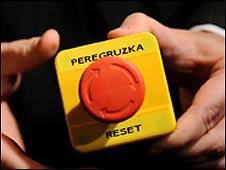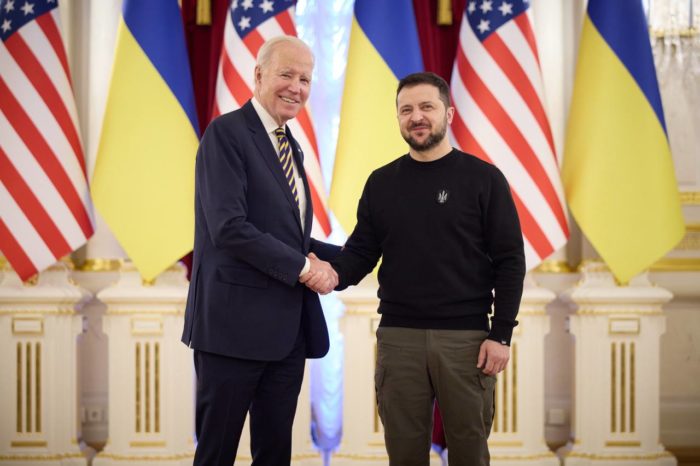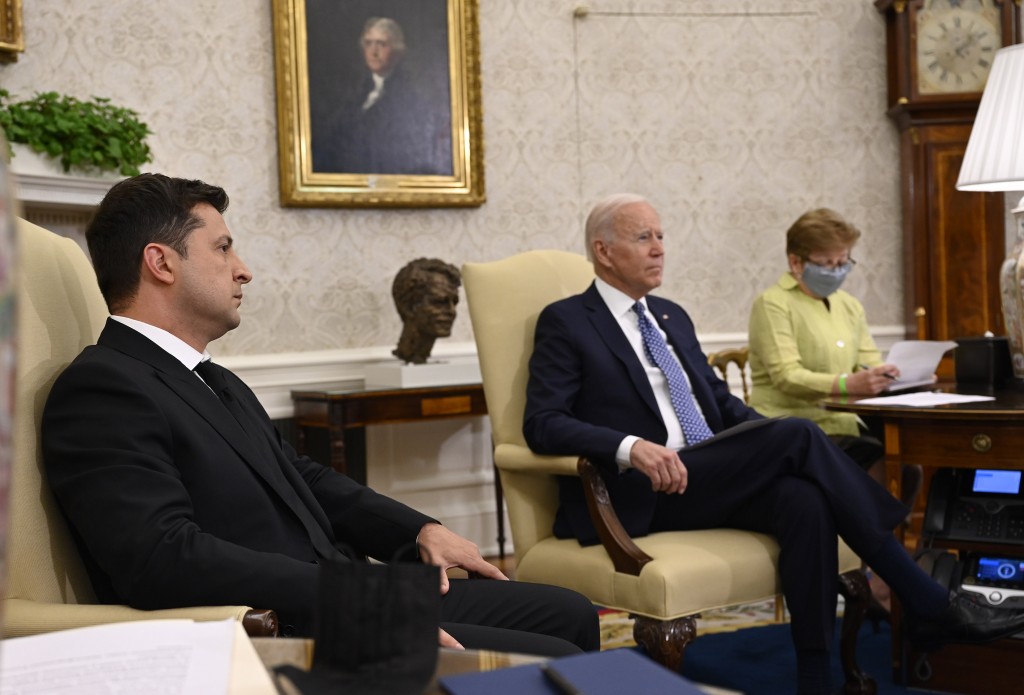On 7 November, CNN followed by other major US news networks called the US presidential elections for former VP Joseph Biden, based on their vote count projection models. The final batches of votes haven’t been counted in several US states yet, and incumbent President Donald Trump’s campaign has been piling up lawsuits alleging voter fraud. However, many world leaders have already congratulated Joe Biden and Kamala Harris as President-elect and Vice President-elect on their victory, including Ukrainian President Zelenskyy. The election isn’t over yet, though fewer doubts remain about the future winner of the upcoming electoral vote.
What implications does the future presidency of Joe Biden bear for Ukraine? Here are four points from an op-ed by Serhiy Sydorenko, editor of European Pravda, which we have abridged.
A lot is going to change for Ukraine as the foreign policy priorities of the future US president are going to be significantly different from those of the incumbent US leader.
Hungarian PM Viktor Orban to have less support from the US

The Hungarian government that campaigned for Trump doesn’t believe in Trump’s victory anymore, and this is clear from the official accounts. Earlier Hungarian PM Viktor Orban personally expressed his support for Trump as presidential candidate, which was announced even on the website of the country’s government under the headline saying that Orban was “seeking another victory for Trump.”
Even if Biden’s campaign hasn’t noticed it yet (which is unlikely), the State Department would remind the future US president of this when a Hungarian issue appears on the agenda. Such an issue could be a dispute between Hungary and Ukraine.
Hungary has been blocking a number of formats of cooperation between Ukraine and NATO, and therefore the United States is not a detached onlooker in the situation, and several times it had to take on the role of arbitrator. Moreover, this is exactly what Orban wanted.
The fact is that Orban still had support only in the White House because he had found common ground and shared views with Trump personally. However, US diplomacy had a number of complaints against the Hungarian prime minister, both regarding respect for human rights and authoritarianism. And about the pressure on Ukraine as well.
It should be emphasized that this does not mean that Biden will now resolve the so-called Hungarian language conflict for Ukraine.
Ukraine would have to negotiate with the Hungarians on its own. And Orban doesn’t see this issue as purely geopolitical but rather he sincerely believes in his mission as a defender of Hungarians living abroad. However, an important point is that Orban wouldn’t be able to count on the support of the White House in his strategy for Kyiv.
The Ukrainian-Hungarian dialogue on this issue has been stalled as Budapest had suspended it last summer without any explanations on its expectations. After the publication of the original article, Ukrainian FM Dmytro Kuleba stated that he had agreed with Hungary to “turn the page” and resume cooperation.
Read more on Ukraine-Hungary tensions:
- Ukraine and Hungary move to settle differences over national minority legislation
- Tensions flare after Hungarian consul caught secretly issuing passports in western Ukraine (2018)
- Ukraine’s new education law unleashes international storm over minority language status (2017)
- Separatism Transcarpathian style: is Hungary aiming to grab a part of Ukraine? (2017)
- Hungary openly helping Putin destabilize Ukraine (2015)
A “reset” with Russia? Don’t expect it

For Ukraine, a more important issue is what policies the US would choose towards Russia, especially given the fact that Biden was the Vice PM of Barack Obama who once sought to improve relations between Washington and the Kremlin and announced a “reset” in 2009.
It is well-known that the decision did not help change Russia, which came no closer to the West and perceived Obama’s complacency as an indulgence for itself. The mistake in Russian inscription on the symbolic button pressed by both then-Secretary of State Hillary Clinton and Russian Foreign Minister Sergei Lavrov, where перезагрузка (“reset”) was misspelled as перегрузка (“overload”), turned out to be prophetic.
The simplest answer to this question is no.
Even if Biden could have had such an inclination (which is quite questionable in and of itself), then too many things have happened in the last 11 years. The image of an aggressive Russia, which fuels conflicts around the globe, tests new nuclear weapons, and poisons its opponents, is completely different from what it was back in 2009 during Obama’s first presidential term.
Moreover, Biden’s party has been attacking President Trump precisely for his flirtation with Russia, which shows a clear rejection of a new reset.
All this would have a significant impact on US policy towards the Donbas, although its details haven’t been outlined yet, in part because the President-elect hasn’t yet chosen his team.
Nevertheless, Biden has already publicly announced the main directions of his Ukrainian policies. He promises to provide military assistance to Ukraine including lethal weapons in order to help withstand the ongoing Russian aggression. And he also plans to encourage the Ukrainian government, businesses, and civil society to fight corruption.
Read also:
- Ukraine risks losing US support as Zelenskyy steps into scandal cooked against Biden
- Five reasons why supporting Ukraine is in the USA’s interests
- US non-recognition policy regarding Crimea one year on
The uncompromising reforms
There is no doubt that the implementation of reforms in Ukraine is going to be the main indicator on which the US would premise building relations with Ukraine.
This was stated in Biden’s statements, it was a major requirement by American diplomacy, and, finally, this was what Biden himself made a priority in the last years in office as VP.
Biden’s main approach in 2014 can be formulated as follows: no matter the amount of assistance from the US and the West, Ukraine’s fate is in its own hands. Both President Obama and VP Biden said by the end of their tenure that Ukraine should end two wars, that against Russia and against corruption.
Read also: Joe Biden: Ukraine is fighting for its future on the battlefields of the East and in the halls of power in Kyiv (2015)

That’s why Biden’s presidency is very good news for the reform-minded political players in Ukraine, especially those focusing on anti-corruption. And Washington will respond firmly to attempts of undermining anti-corruption infrastructure in Ukraine.
Helping Ukraine in becoming a wealthy state is not a separate goal for the US. And if Ukraine proves to the new US president that it doesn’t seek changes, he will not insist.
More on reforms in Ukraine:
- Constitutional Court torpedoes Ukraine’s anti-corruption reform
- Corrupt and biased judges still pollute Ukraine’s judiciary; Zelenskyy’s reform will not fix this
- Reforms in Ukraine are increasingly stagnant, experts say
- 68% of Ukrainians want pro-European reforms even without EU membership prospects (2018)
Ukraine and NATO?
It is worth noting that not all Ukraine-related critical policies of the new US administration are determined so far. Much would depend on such appointments as the new US Secretary of State, the new security adviser, the new appointee who would oversee the US policies towards Ukraine, and so on.
There is no clear view of Ukraine’s Euro-Atlantic integration that is one of the country’s key priorities.

As mentioned above, there is a chance (although not guaranteed) that Ukraine would find an agreement with Hungary to unblock the NATO-Ukraine Commission’s work. But would Ukraine receive support for progress towards obtaining the NATO Membership Action Plan? Will Biden lobby it at least as much as President Bush did in 2008?
The future president himself doesn’t seem to know the answer to this question. One of the factors that may determine his response is Ukraine’s movement (or lack of movement) to implement reforms needed for achieving compliance with NATO standards. It would also depend on Ukraine’s support for global security initiatives and US priorities, that’s why the fact that Ukraine blocked the sale of Motor Sich (a large manufacturer of aircraft engines, – Ed.) to China may be a good argument in favor of Ukraine’s rapprochement with the Alliance.
But what’s sure is that unlike Trump, the new US president understands the importance of international platforms such as NATO, the WTO, the UN, etc and their strength would definitely increase under Biden. This is great news for Ukraine that needs broad support to resist Russian aggression. The United States alone is not enough regarding this matter, so strong international cooperation is exactly what Ukraine needs now.
Read more on Ukraine-NATO relations:
- Ukraine’s new National Security Strategy: Russia as the aggressor, full NATO membership
- Ukraine becomes a NATO Enhanced Opportunities Partner
- 70 years of NATO: why and how the Alliance continues to support Ukraine
- NATO officially gives Ukraine aspiring member status; membership action plan is next ambition (2018)
- Ukraine now more supportive of NATO than Visegrad EU countries






